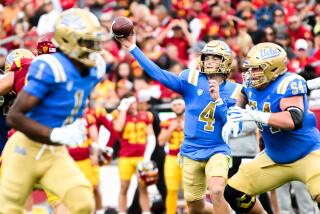How I Made It: Frank Gibeau, Electronic Arts executive
The gig: Frank Gibeau is president of EA Labels, a division of Electronic Arts Inc. that produces the Redwood City, Calif., game company’s top franchises, including Madden NFL, Need for Speed, The Sims and Star Wars: The Old Republic — its most ambitious and costly title ever.
The break: After Gibeau graduated from USC in 1991 with an undergraduate degree in business and international relations, he broke a leg when a stairway collapsed, pinning his leg beneath a block of concrete for nearly an hour. The accident forced him to give up a job he had just landed as a copier salesman for Xerox Corp. to recuperate at his parents’ home in Los Altos, Calif.
His right leg in a cast, Gibeau spent hours playing video games. His father, a Silicon Valley engineer with several patents to his name, showed him a newspaper ad for a job testing games at EA. Resume in hand, Gibeau limped into the lobby of EA, which at the time was a scrappy start-up. He got the job testing a flight simulation game by pointing out that he had been taking flying lessons and was “into planes,” he said.
“I literally fell into my dream job,” said Gibeau, now 43.
Wouldn’t it be cool: Gibeau said he didn’t mind making $10,000 a year less at EA than he would have selling copiers. His job as a game tester was the equivalent of starting out in the mailroom. It was the lowest rung on the ladder.
“I tested games, captured screen shots, did customer service,” he said. “But it didn’t even feel like work. There were games everywhere. And everybody was having a blast. People were there to make great games and have fun. The first thing people would say when they walked into a conference room was, ‘Wouldn’t it be cool if…?’ So that became my mantra.”
Getting “Binged”: Among Gibeau’s mentors at EA was Bing Gordon, the company’s former creative director who went on to become a venture capitalist at Kleiner Perkins Caufield & Byers.
“Bing was a totally non-linear thinker,” Gibeau recalled. “He pushed you in ways you never anticipated. I once walked into Bing’s office to get some ad copy approved, and he told me I had to move to London and help build our publishing business in Europe. I didn’t take the London assignment but a couple weeks later he sent me to Vancouver for 10 months to work on a racing game.”
Gordon’s quirky decisions became the stuff of legend. Whenever he came around, resetting the course for some projects, tweaking the directions of others, employees would call it “getting Binged.” For Gibeau, that meant spearheading the marketing for one game after another. Eventually, Gibeau became Gordon’s go-to man for particularly thorny projects.
The Sims: In 1999, EA was at the threshold of releasing The Sims, a game that had no ending, nothing to shoot and no one to compete against.
“The publisher didn’t understand it, and the creators couldn’t articulate its goals,” Gibeau recalled. “If you asked 15 people to describe the game, you’d get 15 completely different answers. So they sent me in to figure out the marketing.”
After much discussion with The Sims’ developers, Gibeau rallied the team around the notion of a game in which players got to control people in a virtual dollhouse.
The Sims, initially forecast to sell 150,000 units when it came out in early 2000, turned into a multi-game franchise that has sold more than 100 million copies.
Straddling the cultural divide: Game developers have little patience for “suits” — the people who work in the marketing, sales and finance operations of a game company. The suspicion goes both ways, with product managers rolling their eyes when developers say they need more time to complete a game.
On paper, Gibeau is a “suit” — a marketing guy with a master’s in business administration from Santa Clara University. But he found ways around his handicap.
“The breakthrough for me came when I realized a lot of product managers never asked developers for marketing ideas,” Gibeau said. “To me, this was a missed opportunity. You had these people who spent years working on this game, and you don’t bother to ask them what they think. So I made a habit of going to the lead programmer and asking them what they think should be the picture on the box. Along the way, I got some great marketing ideas.”
Gibeau’s other secret weapon was his skill as a player.
“I can hit someone with a head shot from a helicopter going backward at 100 miles per hour” in a first-person shooter game, he said. “When developers see that you can grease them in their own games, they realize that you’re not some punk. They see that you know games, and it generates respect and credibility.”
More to Read
Inside the business of entertainment
The Wide Shot brings you news, analysis and insights on everything from streaming wars to production — and what it all means for the future.
You may occasionally receive promotional content from the Los Angeles Times.










